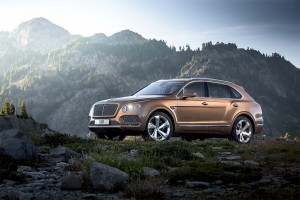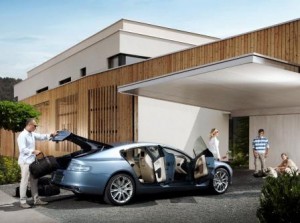
With its new SUV, the Bentayga, ready for dealer showrooms, Bentley revealed some of its future product plans, including its EV options.
With the new Bentayga SUV ready to hit showrooms, British maker Bentley is starting to plan its next product offensive, and that not only will bring updates of existing models like the Mulsanne and Continental GT, but as many as two new ultra-premium luxury models.
Facing ever-stricter global emissions and mileage standards – as well as pressure to add new zero-emissions models – Bentley is also giving serious thought to adding a fully electric drivetrain package. That would be on top of the plug-in hybrid version of the Bentayga set to launch late in 2017 or early 2018, TheDetroitBureau.com has learned.
It wasn’t all that long ago that Bentley was the proverbial one-trick pony. But it has scored huge sales growth in recent years with the addition of the Continental line-up. And with plans to have “five model (lines) in five years,” said Michael Winkler, CEO of Bentley’s U.S. sales arm, the British marque expects to do substantially better.
Bentley sales have been running at or near record levels in recent years, between 10,000 and 12,000 annually. And, says Winkler, “We think in six, seven, eight years we can double that.”
The Bentayga, which reaches U.S. showrooms in July, will be Bentley’s third model line – at a base price of $230,000, filling a price gap somewhere between the top-range Mulsanne and the three Continental based models: the GT coupe, GTC convertible and Flying Spur sedan.
(Click Herefor our review of the all-new Maserati Levante SUV.)
The most likely addition to the line-up would be a production version of the EXP10 Speed Six concept vehicle first revealed at the Geneva Motor Show in 2015. Designed by styling chief Luc Donckerwolke, the show car is smaller than the Continental.
A production model would target the upper reaches of where Mercedes-Benz, BMW and Audi now compete. That would open up a much larger audience than Bentley now serves – but would also raise concerns about diluting the image of exclusivity Bentley has long coveted.
Global CEO Wolfgang Durheimer also has expressed interest in adding a second SUV to the Bentley line-up. That would fit with the broader global shift away from sedans, coupes and sports cars to SUVs and more car-like crossover-utility vehicles.
A second ute would all but certainly be smaller than the current Bentayga. If that were to happen it would share an existing Bentley platform, rather than starting from scratch, said U.S. chief Winkler, though he told TheDetroitBureau.com that neither the EXP10 nor second ute have been given approval by senior corporate management yet.
If a smaller ute does eventually get the go-ahead, it is all but certain to adopt a downsized version of the modular “architecture” developed for the Bentley Bentayga. That same platform will be used, as well, for the next-generation Porsche Cayenne, along with the replacement for the current Audi Q7.
Bentley isn’t about to walk away from the performance market, and CEO Durheimer has hinted, in recent days, that a Speed version of the new Bentayga, topping the “base” model’s 600 horsepower.
But there’s growing pressure on the brand to go green. Future models are all but certain to be lightweighted, shedding the excess mass that has long been a Bentley hallmark. And the British maker is certain to bring more efficient drivetrains to market.
A plug-in hybrid version of the Bentley Bentayga is already in advanced development, though Winkler cautioned that it won’t make its appearance until “at least 18 months after the American launch (of the gas-powered Bentayga) in July” of this year.

Aston wants to plug you into a battery-powered version of the Rapide, which shows just how competitive the luxury EV market is getting.
That plug-in drivetrain could eventually show up as an option for other Bentley models, but the maker is already considering even more advanced options, including a pure battery-electric powertrain. That wouldn’t be entirely unique in the high-line market. Aston Martin, for example, is working up a fully electric version of the four-door Rapide, earlier this year announcing a partnership with Chinese EV maker LeEco.
(For more on the Aston Martin/LeEco alliance, Click Here.)
There are several reasons why luxury makers are exploring electrification options, explained Winkler. For one thing, “Some places around the world, like London, are considering rules that may not let you drive into the city in a car that isn’t electrified.”
And in China, battery vehicles not only qualify from hefty incentives but they are exempt from monthly restrictions on the number of vehicles that can be registered in major cities like Shanghai and Bangkok.
And electric vehicles are losing their old stigma. As Tesla has already shown, battery drive can deliver the same sort of lightning-fast acceleration as the biggest gas engines, the Model S P85d able to launch from 0 to 60 in less than 3 seconds using so-called Ludicrous Mode. Meanwhile, the latest version of the Model can now deliver as much as 300 miles range per charge.
Tesla has also shown that a battery-car can deliver the range a luxury buyer might expect, the latest Model S P90 edition crashing through the 300 mile barrier.
Bentley would have plenty of help plugging into the battery-electric world. Sibling brands Audi and Porsche are making similar moves. The latter is planning to launch an all-electric sports car, the Mission E, while Audi hopes to have a pure battery-electric SUV on the road by 2018. Bentley would all but certainly tap some of the know-how, if not the actual hardware, from those programs for its own battery-electric vehicle.
(Reborn Fisker set to build its updated battery-car in the U.S. Click Here for the latest.)

